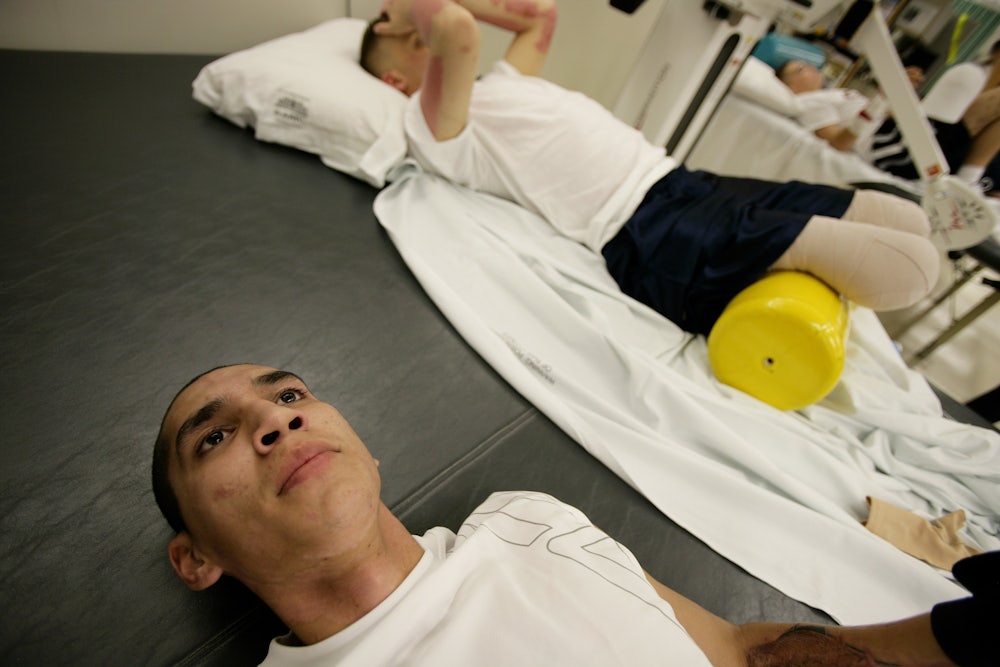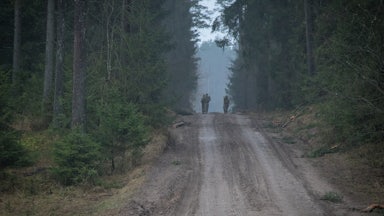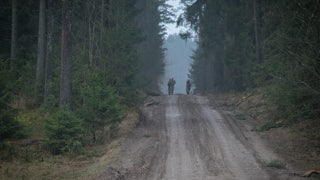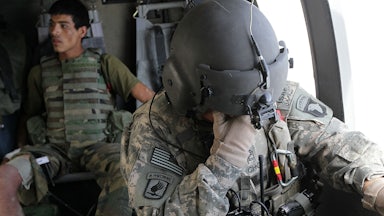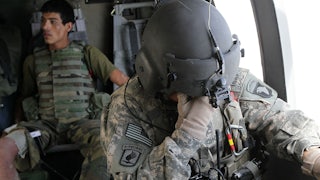Twenty years ago, I was sitting in Mr. Carey’s history
class discussing the differences between constitutional and absolute
monarchies. He got called out of class for a few minutes, and when he came
back, he told us in a deadpan voice, “So there’s been a terrorist attack in New
York. Both of the Twin Towers were hit with hijacked airliners, one of them
just collapsed a few minutes ago, and there may be other hijacked planes. You
now know everything that I know.”
That was the moment I knew I would be going to war. Coming from a family with generations of military service, and knowing that I lacked the commitment to succeed in college, there was no other viable option.
Through several bouts of dumb luck, I made my way. I fell into place as a scout in an airborne cavalry squadron. I got transferred to another cavalry troop weeks before we deployed and went to Afghanistan’s Paktika Province instead of the now-legendary Camp Keating in Nuristan. The transmission on the loaner Humvee I was driving got a hiccup, it changed the order of march, and another truck crew caught the IED. I shattered my fibula parachuting into a mud hole and spent my second deployment running the radios in the troop operations center.
There wasn’t any skill involved in escaping five years, eight months, and four days in the Army relatively unscathed. A lot of the guys I served with didn’t have it so great. They went to Keating. They fought at Saret Koleh. They caught RPGs, or IEDs, or got shot by snipers, or were burned beyond recognition.
The war’s finally over. Though given that I watched a video on Twitter of Taliban-flagged Humvees barnstorming around my old outpost on June 29, it’s safe to say things didn’t end according to plan. We ended it about as fecklessly as one could, and now we have to deal with the second- and third-order effects, or as Chris from Northern Exposure would say, “the Whole Karmic Enchilada.” Radicalized nutballs are just starting to bubble to the surface of the national consciousness—like this tantrum-throwing buffoon, Landon Copeland, who took the hearing for his role in the January 6 attack on the Capitol as an opportunity to turn a court of law into a MAGA bughouse. These guys didn’t just come out of nowhere.
A lot of guys that I know who saw serious action and took brain injuries act like this now. A lot of those same guys got radicalized just like Copeland and believe a lot of that wackadoo Q nonsense. When we got back from Operation Enduring Freedom VIII (“The Ocho!”) in 2008, quite a few of my friends were having serious trouble. Some were the guys that Jake Tapper wrote about in The Outpost. Total mental malfunctions, terrible decision-making, and little to no thought as to the consequences of their actions.
Paranoia, delusional thinking, near-instantaneous escalation to violence—classic exterior symptoms of post-traumatic stress, traumatic brain injuries, and a whole slew of psychological maladies. Did you know that combat trauma can trigger latent bipolar disorder? Neither did I, and in my youth I was too ignorant to recognize what was going on. Such things didn’t even compute until my friend was diagnosed with bipolar (likely from putting fist-size holes in bad guys for a year straight with an enhanced battle rifle).
We went out and did a bunch of now-meaningless things on a Sisyphean crusade for 15 months, and when I finally saw my friends who went to Nuristan after being separated for so long, a decent chunk of them had come back crazy. Drug problems kept rearing up; soldiers getting caught coming back from Amsterdam with a trunk load of drugs, with more getting caught locally by the Polezei or popping hot on urinalysis. My friends that got caught up in it, all I heard from them for the next month were these lunatic rants that, in hindsight, were as logical and coherent as a Trump speech about how they “had a plan to get out of it.” Then, I kid you not, one of them pulled exactly the same move that Copeland pulled in court when they went in front of the squadron commander.
Crazy stuff like this kept happening throughout the squadron.
After we had all gotten out of the Army, I kept tabs on everyone via Facebook.
Over the last 11 years or so, I’ve been watching dudes go through a laundry
list of toxic life events: meteoric marriage/divorce cycles, in and out of rehab,
and homelessness. (I was homeless for a moment there in the winter of 2017—it
happens to the best of us.)
A bunch of my guys spent about a month tracking down our former first sergeant, who had a nervous breakdown and disappeared in Los Angeles on a meth bender. A former platoon sergeant got caught in the nick of time in a bathtub in NYC with his wrists cut open. Another guy I deeply respect died when his liver finally blew out from his attempts to drown himself in Jack Daniels, which, I might add, I found out about because Jake Tapper tweeted the news (I had to notify Tapper through a mutual friend that it wasn’t suicide). My best friend, Jayme, killed himself in a drunken wrestling match with his wife as she tried to take the gun away, which was a week after another friend just shrugged his shoulders and put the gun to his head at the shooting range, which was a week after another friend had killed himself (method unknown). The self-destruction didn’t end there. A year later, it was followed by John, who, after getting all of his rank stripped and kicked out of the Army for a series of DUIs, decided to leave a final Facebook status—Screw all of you, approximately—then took all of the pills from all nine of the bottles the VA docs prescribed.
I still remember helping Jayme clean the gaping hole in John’s arm after an IED. I’m the only person left who does, because everybody else in the aid station that night is now dead.
Three days after John died, I spent a few hours talking his best friend out of killing himself in the middle of the Arizona desert over a joint. Put down the weapon, pick up the spliff. The past decade has been a surrealistic nightmare, and far deadlier than both combat deployments. But what’s worse is that a lot of the guys who weren’t preoccupied with recreational pharmacology or killing themselves were busy elsewhere.
In our quest for justice and denying terrorists a safe haven, we accomplished neither. We’re the guy at the dinner party who claims to be in the import-export business but in all reality is a drug dealer—except instead of bags of cash and mountains of cocaine, we exported world-shattering ultraviolence and imported the very style of extremism we sought so hard to eradicate.
To a normal person, all of the memelords, centipedes, and chan group urchins seem like a sick joke. But to many of the people who got their bells rung a few times, spent the pivotal moments of their lives shooting at people, watching their friends die in miserable and meaningless ways, and who came back from the war into an increasingly alienating online society, these groups were legit.
They had similarly warped senses of what can be considered funny, and offered a sense of belonging. The toxic vetbro lifestyle pumped up their egos, they threw on T-shirts with insane slogans, and scumbag ideologies gave them something on which to focus their seething inner turmoil.
Whereas the vets with whom I willingly associate nowadays spend their time reflecting on the things they did and attempting to learn and grow from the experience, these people dove into the next great war and preparing to shed yet more blood in the name of the latest ridiculous conspiracy theory. So when Donald Trump came along, they were already Three Percenter chapter presidents (one of my former comrades), Proud Boys (an uncomfortable number of my former comrades), or just plain cynical and wanting to watch it all burn down.
They were primed to storm the Capitol and do all manner of heinous things.
What scares the hell out of me is that I understand them because, in weak moments on dark nights, I feel those tendencies—those urges to lash out at authority, the apocalyptic anger at the world for all the disgusting things that happened in Afghanistan and friends I needlessly lost, the indignation that any concept of God would allow such terrible things. Such limitless anger that I can feel the fuse connecting me to reality pop, and the only thing that keeps me in check is my sheer drive to be a decent human being.
So when I see insurrectionist scoundrels like Copeland do completely insane things like that in a court of law, I see my old roommate raging in divorce court. I see my friend flipping out at our squadron commander. I see another on wife number six. I see a path that I am thankful every day that I did not take a decade ago when all of this looney-tunes stuff started happening among friends from my time in the service. I see people who found something to feed their inner demons, and in so doing I stare into a dark mirror at the person who I could have been—a cryptofascist hate-fueled degenerate bent on tearing down the very structures and society he swore to protect, and with every fiber of my being I oppose him.
The war in Afghanistan looked like a war without end even back in 2007 when I first arrived in-country. People have been referring to it by the title of Joe Haldeman’s 1974 epic sci-fi novel, and to those superficially familiar, it is appropriate. But combat operations in southwest Asia, in all regards, were just the opening skirmishes. If we continue to defer any effort toward addressing this national sickness of radicalization, it plays right into their hands. The longer we wait to take a thorough audit of how we reintegrate returned veterans, as well as deal with the physical, mental, and moral injuries generated by this too-often-forgotten, incomprehensibly and immorally drawn-out war, the more recruits these degenerates will find in the hearts of disaffected veterans, and the greater the risk that January 6 will happen again—next time with better special effects and far more bloodshed.
I feel no pity for those who have come under the sway of
this insanity, and neither should you. Those who have broken the law will pay
for their crimes. We need to focus on prevention. Now. Or the Forever War will
have only just begun.
This article has been updated.
